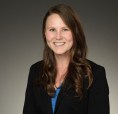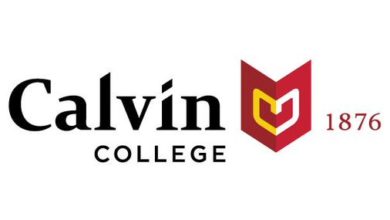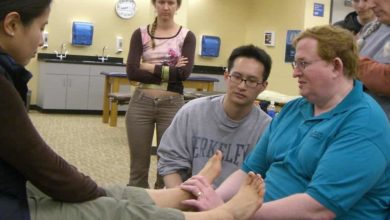10 Questions for a Doctor is a ProspectiveDoctor initiated interview series of physicians of various specialties. The goal of 10 questions is to gain learn more about different physicians, their specialties, and their reasons for going into medicine.
Maria Aleshin graduated from the David Geffen School of Medicine, UCLA last year and matched into a Dermatology residency at UCLA. She is currently in her medical internship year at Kaiser Permanent in Los Angeles.
When did you decide you wanted to become a doctor? What were your main reasons for going into medicine?
Medicine has been a part of my life since an early age. My mother was a doctor in Russia and would often bring my brother and me to the hospital on her evening shifts when she couldn’t find a babysitter. Some of my earliest childhood memories are from those nights. Naturally I wanted to follow in my mom’s footsteps and dreamed of becoming a doctor just like her one day. Although my desire to pursue a career in medicine stuck with me, it wasn’t until I got to college that I began to truly understand what it meant to be a doctor. In college I had the opportunity to explore medicine through various avenues; volunteering at hospitals, shadowing doctors, assisting in clinical research projects, and working at free clinics. These experiences showed me that doctors have an incredibly rewarding and versatile career. They not only are able to care for patients, but they can also mentor students and residents, lead cutting edge research projects, as well as help change policy (just to name a few). Seeing first-hand the numerous opportunities that a career in medicine holds, helped cement my desire to become a doctor.
How/why did you choose the medical school you attended?
I had heard a lot of great things about UCLA medical school before I applied, however it wasn’t until I visited UCLA that I realized that this school would be a great fit for me. The first thing that stuck out to me about UCLA was the people. Everybody, from the students to faculty, was extremely welcoming and went out of their way to be helpful. It was important for me to choose an institution where I liked the people; after all, I was going to be spending the next four years of my life working closely with them. The next thing that I really liked about UCLA was their pass/no-pass grading system. I had gone to UC Berkeley for undergrad and was ready for an environment which fostered collegiality rather than competition. I also liked that UCLA had an integrated systems-based curriculum, as opposed to the traditional curriculum which covers each subject separately (biochemistry, physiology, pathology, etc). UCLA also had less lecture time, which meant that students had more time to get involved in activities, ranging from leadership positions in on-campus groups, to volunteering in homeless clinics, to playing soccer with classmates. I was also drawn to UCLA because it is a large academic institution with numerous opportunities to get involved in basic science or clinical research. The last selling point was the location. Hard to beat 70 degree weather year round and a beach only 5 miles away from campus!
Describe your medical school experience. How hard was it to finance your education?
I feel as though I was extremely fortunate that I had the opportunity to attend medical school at UCLA. The four years I spent at UCLA were some of the most challenging, yet rewarding, years of my life. During the first year of medical school I spent most of my time getting to know my classmates and re-learning how to study, which was much more time-consuming than I had originally anticipated. By the time second year came around, I finally felt more comfortable simply being a medical student, and started to get involved both inside and outside of the classroom. I became involved in basic science research, coordinated a homeless clinic, volunteered at a women’s jail, and served as an officer of several on-campus groups. During my third and fourth year, I focused most of my energy on exploring the various fields of medicine.
Medical education isn’t cheap. The yearly tuition along with the cost of living in Los Angeles definitely leaves a pretty big dent in your pocket. Although I received a few scholarships from UCLA, they did not come close to covering all of my costs. I tried to save money wherever I could, however still had to take out a significant amount of money in loans.
How/why did you choose your medical specialty? Was there any part of your path to medicine that you would have done differently?
I was first introduced to the field of dermatology after attending a lecture at UCLA that discussed the role of immunotherapy in the treatment of melanoma. I had known people who had been affected by melanoma, as such was eager to learn more about this promising new therapy. This curiosity ultimately led me to the laboratory of a prominent leader in melanoma research. While in the lab I was able to work with individuals from numerous fields. The dermatologists I met encouraged me to come shadow them in order to gain a better sense of what the field of dermatology entails. These experiences, along with my long-standing interest in research and teaching, shaped my desire to pursue a career in academic dermatology.
What do you like about your job? What do you dislike?
I am currently doing my preliminary year of medicine at Kaiser Sunset Los Angeles. I just finished medical school and began working as an intern two months ago. It is both exhilarating and terrifying to finally be a doctor who is responsible for taking care of patients. The thing I enjoy most about my job is the variety. On any given day I can spend time talking to patients and their families, yet I also have the opportunity to perform procedures. I can also learn from fellow residents and attendings, yet I also can teach and mentor medical students. The thing that I dislike most about my job is the endless “paperwork.” I feel as though a great deal of time every day is spent in front of the computer writing notes, placing orders, etc. Although I know that proper documentation is extremely important, I feel as though it takes away from time that we could be spending with our patients.
Describe a typical day at work. How many hours do you work a week?
Our intern year is broken up into eleven blocks that are each four-five weeks in length. During one block we may be managing patients on wards, whereas another block we are cross-covering patients overnight, and another block we may be doing shift-work in the emergency room. Because each block is so different, it is hard to describe a typical day. However I will describe a typical day on wards since that is what most people associate with intern year. I typically come into the hospital around 6:30am to pre-round on my patients before going to morning report. Afterwards, the team rounds with the attending typically until noon. During lunch-time there is a noon-conference which is followed by floor work/note writing in the afternoon. Typically interns can sign out at 5pm if they are not on-call. When a team is on call, they typically stay until 9-10pm admitting new patients. During intern year, most residents work about 70-80 hrs/week.
How difficult is it to balance work and the rest of your life? Do you have any strategies on how to balance work and life outside of work?
As an intern I am working about 80 hours per week, which averages out to roughly 12 hours per day. Factoring in the commute, there is typically less than 11 hours left a day to sleep, eat, shower, run errands and “have a life.” As interns we spend countless hours focusing on the health of others, however we often neglect our own health. We stop working out, start eating poorly, and get hooked on caffeine to fight our sleep-deprived states. We start to spend less and less time with our family and friends, instead choosing to veg out in front of the TV. In order to survive intern year, we must fight against these poor habits. Because our time is limited, we must spend what little time we have on ourselves and our well-being. Whether that means going to the gym after work, or to the movies with your friends, or on a date-night with your significant other, we must make an effort to continue to do the things that make us who we are. Otherwise it becomes easy to lose yourself during intern year. We must surround ourselves with people who can support us during this difficult time. The most important thing to remember is that life doesn’t stop during residency. Although it becomes more challenging to manage your time, it’s important to remember to keep living your life.
Does your job allow you to have the lifestyle that you want?
Dermatology is largely an out-patient specialty, with most dermatologists working 8am-5pm, five days a week. Furthermore, dermatology is unique because it rarely has any after-hour emergencies. As such, it is one of the few fields in medicine where it is possible to work close to a 40 hour work week. This is why many people consider dermatology a “lifestyle specialty.”
What advice would you give to students who are interested in your specialty?
Dermatology is known for being a challenging specialty to apply into. As a medical student I often heard that a dermatology applicant must have stellar board scores, numerous first author publications, as well as all honors on their clinical rotations. It’s hard not to get discouraged after hearing such impossibly high standards. Dermatology is a rather small field with few programs nation-wide, therefore by default there are fewer spots for interested applicants. That’s not to say that if someone is interested in dermatology they shouldn’t apply. Rather, they must be prepared to work hard. I don’t know what the secret formula is for getting into dermatology, but I do know that through hard work and perseverance anything is possible. If a student knows that they are interested in dermatology, I would recommend that they get to know the faculty and residents at their medical school. They should try to shadow whenever they can or attend grand rounds, pretty much anything that shows that they are interested in the field. If the student has time and they are interested, they can get involved in some scholarly pursuit whether it be writing a review paper, case report, or being involved in bench research. Students should also excel during their clinical rotations. That’s not to say they need all honors, instead they should show a genuine interest in all aspects of medicine and demonstrate that they have good work ethic and that they work well with others. Lastly, the dreaded topic: board scores. The boards are a stressful time for every medical student, irrespective of what they are applying into. I would recommend that students try their best on the exam, however shouldn’t place all their eggs in one basket. One board score will not make or break their future careers. Rather it’s the whole package. I would strongly recommend that students interested in applying into dermatology find a dermatology mentor and talk to other students who have applied before them.
What advice would you give to people who are interested in becoming a doctor?
It seems as though applying for medical school becomes tougher and tougher every year. Although it’s easy to get discouraged, it’s important to remember what your ultimate goal is. If you truly want to be a doctor, you will make it happen! If you don’t succeed the first time, try again. Some small tidbits of advice for the application process. Apply early. Apply broadly. Finish secondary applications as soon as possible. Talk to people who have applied to medical school before you. Ask them what worked for them and what didn’t work. Surround yourself with friends and family that will support you through the application process. Be patient; the application process is a marathon, not a sprint. And lastly, don’t doubt yourself. The application process is a rollercoaster and there will certainly be ups and downs. Try not to get discouraged and keep your eye on your long term goal.




